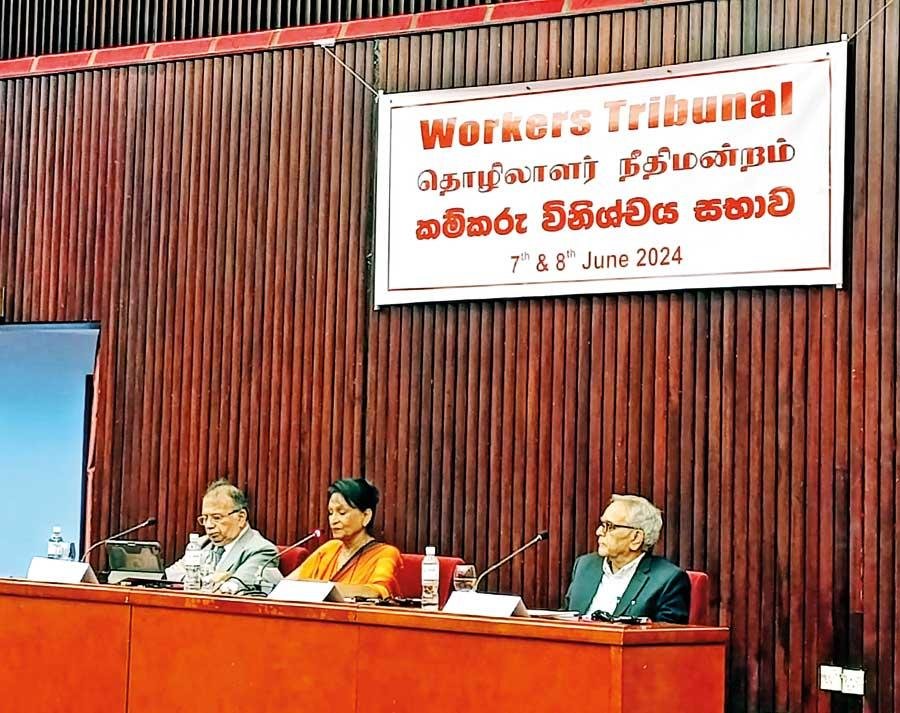‘A Collective Voice must be raised for Plantation Workers’
Ceylon Workers Red Flag Union
“This Tribunal is horrified and shocked by the stark realities of the lives of tea and rubber plantation workers. It has shocked the conscience of the members of the Tribunal that such practices could continue unabated in the modern civilised world. The Tribunal is moved by the heart-rending testimonies of the workers, especially the women workers.”
This was what Justice A P Shah said in the judgment on the situation of workers, especially women workers in Sri Lanka at the concluding session of the Workers’ Tribunal.
The Workers’ Tribunal, a historic event held on 7 & 8 June 2024 in Colombo, was a platform by workers for workers to share testimonies on their conditions of service including working and living conditions, labour rights and entitlements. Eleven workers gave their testimonies and three union leaders made submissions. It was a space for workers’ voices to be heard by eminent judicial personalities and to consider the workers’ views on the conditions they work in, which have gone unacknowledged and unaddressed for decades, depriving them of their legitimate rights as workers in the tea and rubber plantations in Sri Lanka. This Tribunal was able to highlight plantation workers’ voices, and violations of their worker rights heard nationally, regionally, and internationally.
The eminent [retired] judges included Justice A. P. Shah from India, Justice Shiranee Thilakawardane from Sri Lanka and Justice Pawan Kumar Ojha from Nepal.
Background
For over three decades, the plantation Collective Agreement substantively governed minimum wages, working conditions and dispute resolution mechanisms for workers. With the withdrawal from the Collective Agreement by the plantation companies in 2019, the companies rejected any further discussions or participation in worker problems with unions, engaged in union busting practices, and ramped up practices of informalisation or casualisation of labour.
The Ceylon Workers Red Flag Union (CWRFU) became engaged in intensive discussions with members during this time and recognised that these plantation workers’ livelihood and job security was endangered. In this situation, the union decided to convene a Workers’ Tribunal and provide an effective platform for workers to voice their grievances and demand dignity and justice.
The Tribunal strongly affirmed that all workers, including plantation workers, are human beings who are inherently, inalienably entitled to fundamental human rights.
The main recommendations of the Tribunal were:
In respect of the wages of workers, the Tribunal recommended that the Wages Boards for Tea and Rubber Plantations review the current decision on minimum wage based on the concept of a living wage that sustains a decent standard of living for a worker and her family. In the meantime, the State must ensure that workers get the minimum wage of Rs 1700 proposed by the Government. It also strongly recommended that the Ministry of Labour enact legislation that is able to protect the tenure and sanctity of the Collective Agreement and that does not allow any party to the agreement to easily exit from it with a mere one-month notice.
Regarding living and working conditions, the Tribunal recommended that the State stipulate minimum standards for working conditions specific to tea and rubber plantation workers, ensuring that all workers in the field have access to adequate number of toilets with water facilities separately for women and men, access to adequate, clean drinking water and water for washing, a safe and secure place for having food and rest, and for feeding infants, creche facilities, first aid box with a trained person. Given the predominance of women workers, working conditions must address safety, sanitation needs vis-a-vis periods, facilities for rest and breast feeding for new mothers in the working environment, and recognition of domestic care work performed by women, and facilitate this through arrangements made in their workplace. The State must ensure an adequate standard of housing that includes adequate space for a family, running water and a permanent structure. The government should ensure that workers are not evicted from their houses.
In respect of social security, the Tribunal ruled that the government should ensure that workers are covered by all government social safety mechanisms and equality before the law and equal protection of the law for plantation workers as citizens of the country. All post-retirement benefits like Employees Trust Fund (ETF), Employees Provident Fund (EPF), as well as benefits like maternity benefits, should be calculated on the basis of the full wage of the workers.
With regard to issues of Occupational Health and Safety, the Minister in charge of Labour must take the lead in passing regulations specific to the plantation sector. This should include threats to workers from wild animals, insects such as wasps and leeches and reptiles, as well as chemicals they use during their work. This is especially true of women in their reproductive roles. The workers must be provided with personal protective equipment. The government may put down detailed rules and regulations along with actionable penalties and other consequences, including proper compensation. In addition, the government must set up a tripartite and independent monitoring system where women workers play a lead role in the monitoring process. Plantation workers must be brought within the ambit of the public health system, which should be strengthened by adequate resources, including doctors and other trained medical personnel as well as adequate and appropriate medication.
The Tribunal expressed its dismay at the level and processes of casualisation and informalisation adopted in the plantation sector. The Tribunal ruled that the State respond proactively to such processes by protecting the labour rights of all workers, irrespective of their status. It is the duty of the government to reverse these processes of contractualisation and informalisation such as Revenue Sharing Model (RSM), bought-leaf system, buy back / buy bag system, plot land (thundu-kani), manpower etc. and ensure the health of the industries and the rights of the workers. The government should effectively implement the existing laws pertaining to the plantation sectors, like tea and rubber. Any gaps in the existing legislative provisions should be reviewed periodically and be revised in favour of the rights of workers. It is recommended that a law on the protection of the plantation workers be introduced, whereby an authority is established to receive complaints and proactively intervene in labour disputes. The Minister of Labour should ensure that appropriate legislative measures are taken to legally empower workers, create legal obligations on employers and have legally enforceable rights and duties for a dispute resolution system. A legal aid scheme for workers pursuing labour disputes at higher forums must also be facilitated.
The Tribunal appealed to all trade unions to come together on the most basic issues facing plantation workers. The abysmal working and living conditions must be an urgent concern and a collective voice must be raised.
Kandy – 10.06.2024
***
The Workers Tribunal on Plantation Workers in Sri Lanka:
Findings and Recommendations
Retd. Justice A. P. Shah (India), Retd. Justice Shiranee Thilakawardane (Sri Lanka), Retd. Justice Pawan Kumar Ojha (Nepal)
Colombo – 8 June 2024
- This Tribunal is horrified by the stark realities of the lives of tea and rubber plantation workers. It has shocked the conscience of the Tribunal that such practices could continue unabated in the modern civilised world. The Tribunal is moved by the heart-rending testimonies of the workers, especially the women workers.
- This Tribunal observes that the daily wage is at the heart of the issues faced by the workers. Workers experience abysmal pay, extremely slow progression in wage increase and blatant non-implementation of wage increases. The wage increases have been defeated by practices such as reducing the weight of tea leaves collected; unilaterally increasing norms to be met to receive the stipulated daily wage; refusing to allocate legitimate working days in a month by insidious casualisation of workforce; and reducing allowances added to the basic wage. This subterfuge enables employers to blatantly flout minimum wage decided by the statutory body, such as the Wages Boards leading into a situation of destitution for workers.
- The collective agreement was experienced by workers as a relatively useful tool for protecting their rights. Unfortunately, such agreements have not been afforded the sanctity of the tenure as recognised in neighbouring jurisdictions and as a result the last agreement was terminated by the employers with just one month’s notice and now they are refusing to negotiate even for the bare minimal framework of labour protection. Employers have thus unilaterally chosen to abandon the process of collective bargaining which is a right recognised in the statutory framework of Sri Lanka as well as international conventions, such as the ILO Conventions to which Sri Lanka is a signatory.
- This Tribunal particularly finds that casualisation and informalisation of the workforce extremely troubling as it strips the workers of their fundamental protection of basic rights which are bestowed by the labour laws of Sri Lanka.
- This Tribunal further notes with profound anguish that there has been a blatant lack of fundamental living standards and working conditions for plantation workers, especially women workers in plantations. The right to life which is recognised and protected by the Sri Lankan Supreme Court does not mean a mere animal existence, it means something more than just physical survival. It emphasises an inalienable right to live and work with dignity.
- This Tribunal is also deeply concerned with the blatant disregard for workers’ occupational health and safety. It is noted that the Sri Lankan legal framework does not have specific laws addressing the issues of plantation workers, existing in neighbouring jurisdictions such as India and Malaysia.
- This Tribunal finds with a heavy heart that the sufferings and woes of plantation workers have continued for generations since they arrived on the shores of Ceylon 200 years ago. The current state of affairs is one of systemic discrimination and exploitation and reduces them to bonded labour. Thereupon perpetually affecting the lives of the workers, intergenerationally.
- The Tribunal strongly affirms that all workers, including plantation workers, are entitled to the freedom of association and the effective recognition of the right to collective bargaining; elimination of all forms of forced or compulsory labour; the elimination of discrimination in respect of employment and occupation; and a safe and healthy working environment.
- In light of these findings the Tribunal presents the following recommendations.
Recommendations
Wages
- It is recommended that all measures be taken by all stakeholders including the State to execute in letter and spirit, without delay, the minimum wage of Rs1700 fixed by the government.
- The government should prohibit all unfair practices adopted by the plantation companies, such as reducing days of work, arbitrarily increasing the norms/daily targets and informalising/casualising of labour to deprive the workers of their right to receive the minimum wage as statutorily fixed.
- It is recommended that the government should appoint a committee comprising of workers (including women workers), employers and experts in the field to review the current economic conditions and cost of living of plantation workers and determine a fair living wage that sustains a basic standard of living for a worker and her family.
Preserving the Tenure of Collective Agreements
- It is recommended that the government should bring laws/rules to protect the sanctity of the tenure of collective agreements and to preclude parties from arbitrarily rescinding such agreements. Collective agreements that require prolonged negotiation and impact every aspect of the lives of scores of workers cannot be terminated at will.
Living and Working Conditions
- It is recommended that the State stipulate minimum standards for working conditions specific to tea and rubber plantation workers. Such minimum standards must address the following:
a. Decent working hours, intervals for rest and meals, facilities for safe sanitation and meal consumption, clean drinking water and medical attention.
b. Given the predominance of women workers in plantations, working conditions must address safety, sanitation needs vis-a-vis periods, facilities for rest and breast feeding for new mothers, feeding infants and creche facilities.
- It is recommended that the State must recognise the plantation workers’ right of adequate housing which is a part of the right to life that is recognised by the Supreme Court of Sri Lanka as a fundamental right. An adequate standard of housing must include adequate space for a family, a permanent structure, water, and other basic facilities.
Social Securities
- Ensure coverage of government social safety mechanisms in the plantations that affirm equality before the law and equal protection of the law for plantation workers. The state must recognise that plantation workers are the poorest segment of the country’s workforce and are in need of statutory support.
- All plantation workers should receive post-retirement benefits (ETF, EPF, gratuity) calculated on the basis of the full wage including all allowances.
Occupational Health and Safety
- The government has already established the National Institute of Occupational Safety and Health (NIOSH) under National Institute of Occupational Safety and Health Act No. 38 of 2009. Using the powers under this Act, the NIOSH must advise the Minister of Labour on formulation of policy with regard to standards, codes, practices and guidelines in matters relating to occupational health and safety of plantation workers, for example, threat from wild animals, insects and reptiles, precarious condition of pregnant women and lactating mothers working in the fields. Especially, workers in rubber plantations must be provided with personal protective gear like gloves, boots, protective goggles, masks etc, especially when they work with chemicals.
- The government may put down detailed rules and regulations along with actionable penalties and other consequences for lack of due diligence both in not ensuring workplace safety and in not ensuring proper compensation in the event of an injury/harm.
- The government must bring into force and implement the Cabinet Decision to integrate 450 Estate Dispensaries (primary health care centres in plantations) with the government health system and provide for a further 59 Estate Dispensaries in Provincial Health Authorities.
State must respond proactively to stop casualisation of labour in the plantations
- It is recommended that the Government bring laws and rules to prevent and discourage casualisation/informalisation of plantation workers, which in turn deprive them of statutory rights such as minimum wage, protection from unlawful termination, compensation for injuries at the workplace, retirement benefits such as provident fund and gratuity, maternity benefits as well as the right to unionise and engage in collective action.
A New and Separate Law to Protect Plantation Workers
- It is recommended that the State consider passing, similar to the Shop and Office Act and the Factories Ordinance, a law specific to the protection of plantation workers on the lines of the existing laws in countries such as India and Malaysia.
Image Source: https://bit.ly/3RxkMYt
You May Also Like…
Gananath Obeyesekere: The Anthropologist and the Historian
John D. Rogers
I first met Gananath at the Annual Conference of the Association for Asian Studies in Washington DC in March 1984,...
The Creation of the Hunter. The Vädda Presence in the Kandyan Kingdom: A Re-Examination. Gananath Obeyesekere. Colombo: Sailfish, 2022.
R. S. Perinbanayagam
Robert Siddharthan Perinbanayagam died on 5 November 2025 in New York City where he lived most of his life. Born in...
‘Guru-Ship’: An Epistemological Turn in My Anthropological Education
Sanmugeswaran Pathmanesan
This paper narrates the epistemological shift that took place in my anthropology learning journey, mapping how the...




